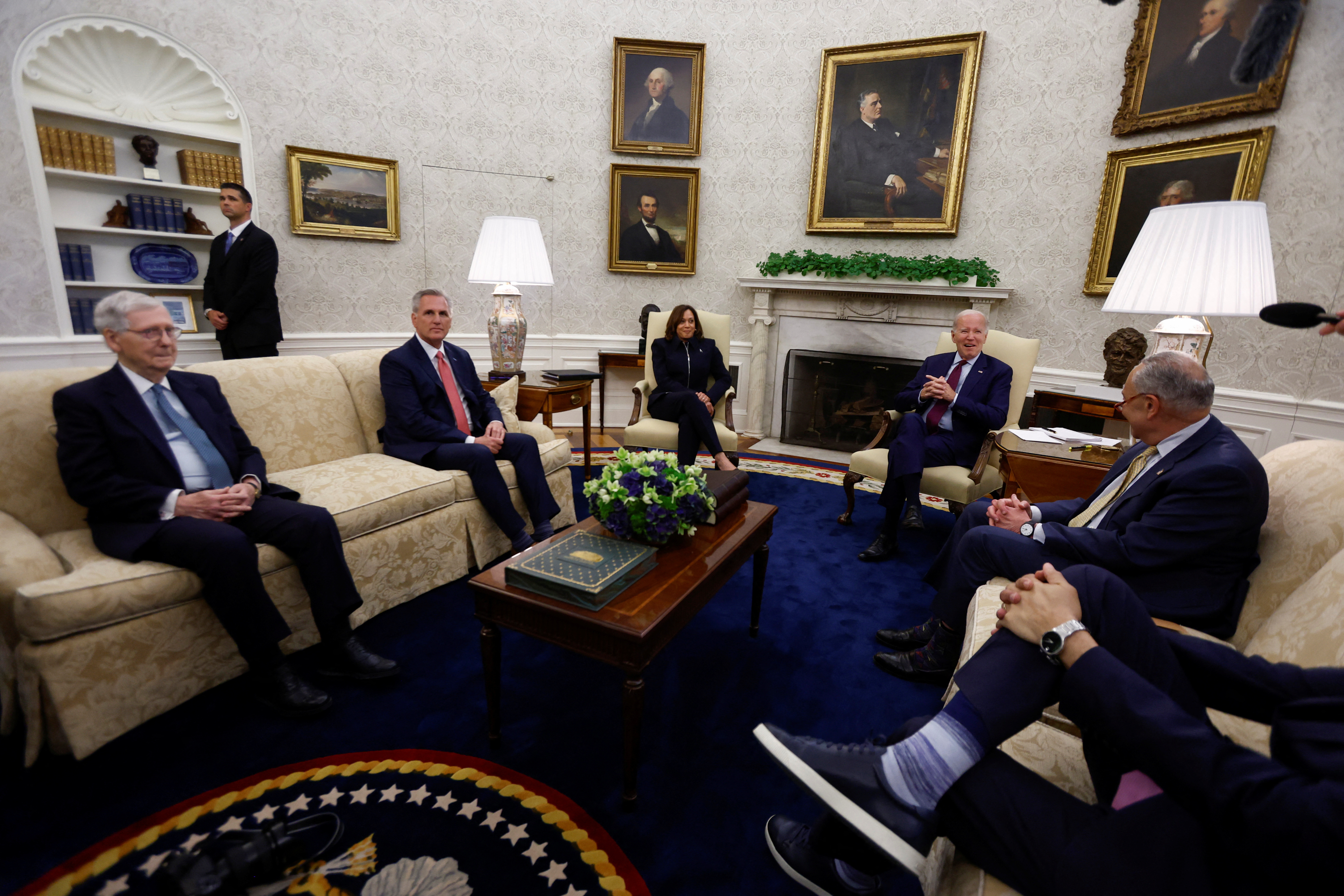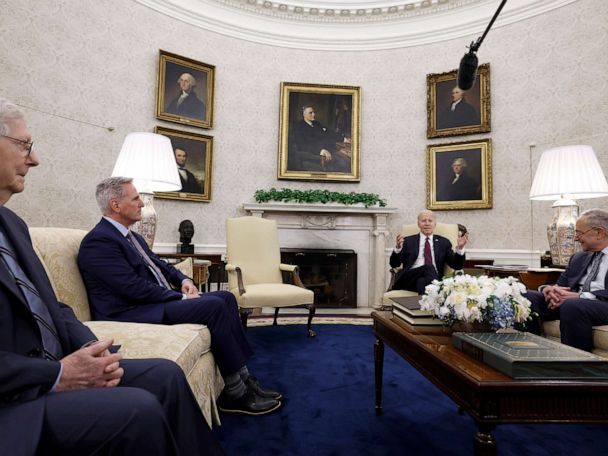Democratic President Joe Biden and senior Republican congressional leader Kevin McCarthy moved closer to a compromise to prevent a U.S. debt default on Tuesday, as the possibility of an economic nightmare pushed Biden to cancel a trip to Asia this week.
Following an hour of discussions, House Speaker Kevin McCarthy informed reporters that the two sides were still far apart on a deal to raise the debt ceiling. Nonetheless, he stated, “It is feasible to get an agreement before the end of the week. It is not difficult to get an agreement.”
Democrats were less enthusiastic with the short time constraint, but the White House described the sessions as “constructive and straightforward.” Biden stated that the leaders achieved an agreement “There is a widespread agreement… that defaulting on the debt is simply not an option. Our economy would enter a slump.”
“There’s still work to be done,” Biden said at a White House ceremony commemorating Jewish Americans, adding that the parties were “on the right track to ensure that America does not default on its debt for the first time.”
Biden said he was disappointed that Republicans will not consider ways to raise revenue. Raising taxes on the wealthy and companies to help pay for programs for other Americans is a key part of Biden’s 2024 budget.
Biden met for about an hour with McCarthy, Senate Majority Leader Chuck Schumer, Senate Republican leader Mitch McConnell and House Democratic leader Hakeem Jeffries after their aides met over the weekend to try to strike a deal.
Republicans have refused to vote to lift the debt ceiling past its $31.3 trillion limit unless Biden and his Democrats agree to spending cuts in the federal budget. However, McConnell said after the meeting, “We know we’re not going to default.”
The U.S. government may default on some debts as early as June 1 unless Congress votes to lift the debt ceiling, and economists fear the country will slide into a recession.
Biden is “optimistic that there is a path to a responsible, bipartisan budget agreement if both sides negotiate in good faith and recognize that neither side will get everything it wants,” the White House said.
Biden and congressional leaders’ staff have met several times over the past week on the issue. Going forward, the talks will be narrowed for more engagement between House Republicans and the White House, McCarthy said.
Biden, who departs for Japan on Wednesday, said he will speak regularly with congressional leaders by phone, and the White House said he would meet with them upon his return.
White House adviser Steve Ricchetti, budget director Shalanda Young and legislative adviser Louisa Terrell will lead discussions for the administration, joining Republican Representative Garrett Graves.
Rohit Kumar, a former senior McConnell aide who is now co-leader of PwC’s national tax office in Washington, said such direct negotiations had a proven track record. “It frees up the administration to make some necessary concessions that won’t be popular with House and Senate Democrats but also won’t imperil passage of an agreement,” he said.

Neil Bradley, chief policy officer at the U.S. Chamber of Commerce, welcomed the narrower scope and structure of the talks. “We believe there is a path forward on a bipartisan deal that lifts the debt limit and makes important reforms to improve our nation’s fiscal health,” he said.
Continued uncertainty around the debt ceiling prompted Biden to skip stops in Papua New Guinea and Australia after he attends a Group of Seven summit of the world’s richest countries in Hiroshima, Japan.
“We’ve got a lot of work to do in a short amount of time,” McCarthy told reporters, saying the Oval Office session had set the stage for future conversations.
WORK REQUIREMENTS
Ahead of the meeting, sources said Biden and McCarthy’s aides had discussed the requirements for two key programs that provide food and cash aid to families.
Expanding the work requirements has been a key demand of Republicans, who are also pushing for spending cuts in exchange for their votes to raise the debt limit. McCarthy told reporters on Tuesday that his party, which controls the House by a 222-213 margin, would only agree to a deal that cuts spending.
“We can raise the debt ceiling if we limit what we’re going to spend in the future,” McCarthy told reporters.
Both parties agree on the need for urgent action.
In the past week, staffs for both sides have discussed a range of issues. In addition to work requirements for some benefit programs for low-income Americans, spending caps and changes to energy permitting have been proposed in exchange for votes to lift the limit, according to people briefed on the talks.
The sources, who spoke on condition of anonymity to reveal details about closed-door negotiations, said the work requirement talks focus on the Supplemental Nutrition Assistance Program (SNAP), previously known as food stamps, and the Temporary Assistance for Needy Families program.
Biden alluded to the negotiations in public remarks over the weekend, saying he would not consider such a move for the Medicaid health program for low-income Americans.
PREVIOUS DOWNGRADE
A similar 2011 standoff over the debt limit led to a historic downgrade of the U.S. credit rating, sparking a sell-off in stocks and pushing the government’s borrowing costs higher.
The current deadlock has rattled investors, sending the cost of insuring exposure to U.S. government debt to record highs. A Reuters/Ipsos poll completed on Monday found that three-fourths of Americans fear a default would take a heavy toll on families like theirs.


